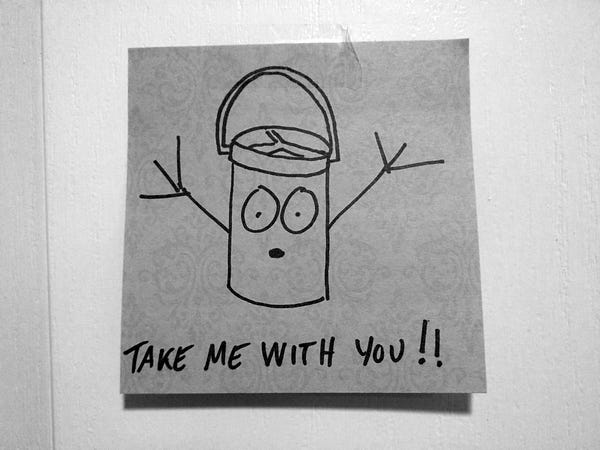Guest Column by Heather Byrant
So this one time at a journalism conference…
I was talking to this person whom I’d just met. They told me about their job and where they worked. They asked me about mine. I told them I’d worked in public media in Alaska before moving to the Lower 48. I was a couple of months from wrapping up my time as a John S. Knight Fellow at Stanford. They asked about what I worked on and I explained my research around collaboration in journalism and that I intended to continue working in this space after the fellowship ended.
“Well, what does your husband do?”
“He’s a truck driver and a mechanic.”
“…Oh.”
“Yeah, right now he drives for a trash company.”
“That must be…an interesting perspective to have around.”

While they didn’t explicitly say it, the person was very much thrown off by the nature of my husband’s work. I was left with a very strong feeling they were expecting a more middle-class answer than a garbage worker. Their facial reaction has been stuck in my head for a while now. Surprise. A little confusion. And just enough distaste to notice. Obviously, this one instance isn’t representative of an entire industry. But it is a symptom.
Neither my husband nor myself are from a middle class family. You could characterize my husband’s as the working class assortment of blue-collar farmers, factory workers and so on that are common in the rural spaces of the Midwest a few hours away from the bigger cities. Mine could see working class from where we were if we squinted hard enough. I was raised by my grandmother who took care of three kids while getting by on $700 a month of social security supplemented by food stamps and Medicaid. The ends never met and I grew up well versed in the facial expressions of those who looked down on us.
Journalism has a class problem. We know this. The best internships are for students with the resources to work unpaid or with low pay in some of the most expensive cities in the country. Conferences are expensive and often hosted in expensive cities making it difficult for smaller newsrooms to send reporters. The bulk of the jobs are clustered in major metropolitan areas. That’s not to say people without means don’t make it into journalism. They do. But it’s a longer, rougher road with far fewer people making it to the end.
That person was genuinely surprised that the spouse of a journalist had such a blue collar job. The reaction makes me wonder how badly our industry really lacks for people with more diverse socioeconomic backgrounds. Our journalism would be better if we were a better representation of the backgrounds and experiences our audiences have.
It’s the Fourth of July. My husband’s at work. He probably won’t be home until late tonight even though he left at 3:30 this morning. His schedule has been consistently like this for weeks now. He’ll be tired and sweaty. He’ll have maybe 30 minutes to eat dinner, shower and get to bed if he wants at least 7 hours of sleep.

I’ll leave a post-it note on his morning clothes pile to read when he gets up and there’s another one on the door reminding him not to forget his water jug. He’ll leave one for me on my computer screen. When I go to bed later, he’ll roll over and mumble and search for my hand and wrap around me in his sleep.
He doesn’t have a four year degree. He’s damn good at his job. He’s good at running a team. It matters to him that he takes care of the people on his routes. He takes the bins back up the drive when he knows the resident is elderly. He is endlessly curious about learning new things. I’d wager that he has a hell of a lot better understanding of people than some of the journalists that I know.
There’s a recurring theme in the work stories he shares with me. His routes take him all over the Bay Area. Through the nice neighborhoods of the upper middle class and the extremely well off gated communities. Through the working class communities, the rougher parts of Oakland and the areas where the businesses are surrounded by the homeless. It’s fascinating how people treat him based on only their knowledge that he is the trash guy. The vast majority of disrespect, rudeness and condescension happens in what many would call the nicer neighborhoods. Kindness and appreciation, people giving him a cold drink on a hot day or just saying thanks happens most in the rougher neighborhoods and the working class areas.
I have a four-year degree. For the past year, the word Stanford has been part of my bio when I meet people. Barring the odds and ends that can come with being a woman in media and tech, most of the journalists I encounter generally respect me and what I do.
When he and I are meeting a new group of people in my industry, he asks me how to talk about his job. Because he knows that sometimes it’s better to say something generic like “trucking industry” than “garbage man.” He worries that he might embarrass me in front of other journalists.
If that conference interaction is how a journalist responds to my husband’s job while idly chatting, how do they cover the sanitation worker that ends up in a story they are working on? If talking about someone to that person’s spouse isn’t enough to cause one to mask aversion, how do they talk about people to whom they feel even more distance from? What does this mean for our audience’s ability to trust us?
Our industry needs to think hard about the worlds we’re living in, the kinds we’re building with each hire we make and ones that we want to reach with our reporting.
Heather Bryant is the founder and director of Project Facet, an open source software project to help manage the editorial process and facilitate collaboration between newsrooms. She just finished her JSK Fellowship at Stanford working to help newsrooms build effective and meaningful editorial collaborations and is continuing that work with research and consulting around editorial collaboration.

















